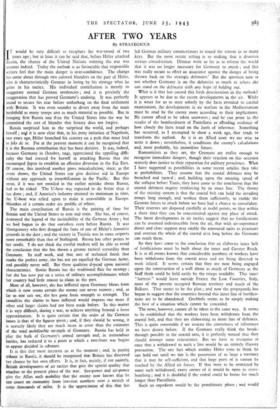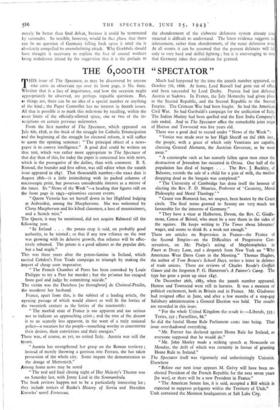AFTER TWO YEARS
By STRATEGICUS
Russia surprised him as she surprised the world, and perhaps herself ; anti it is now clear that, in his petty imitation of 'Napoleon, two years ago, Hitler launched his country on a path that must lead to •feto de le. For at the present moment it can be recognised that it is the Russian contribution that has been decisive. -It was, indeed, because Germany in October, 1941, appreciated the appalling diffi- culty -she had created -for herself in attacking Russia that she encouraged japan to establish an effective diversion in the Far East. Of course, this involved another gross miscalculation, since, as the event shows, the United States can give decisive aid in 'Europe without any approach to immobilisation in the 'Pacific. But this error, if it was not entailed in the earlier mistake about Russia, had to be -risked • The 'U-boat was expected to do better than it has done ; and, if America's industry attained its maximum in time, the U-boat was -relied upon to make it unavailable in 'Europe. Mistakes of a -certain order are prolific of others.
The main contribution of -Russia is the gaining of time for Britain and-the United States-to arm and train. She has, of course, destroyed the legend of the invincibility of the German Army ; but we -had begun -to do -that ourselves even -before Russia. 'It was Montgomery who-first dragged the fame of one of Hitler's favourite generals in the dust ; and the victory in Tunisia was in some respects more remarkable than that of -Stalingrad. Russia has other points to her credit. I do-not think the careful student will be able to avoid the conclusion that she has shown a greater tactical versatility than Germany. In staff work, and that sort of technical finish that marks the perfect army, she has not yet equalled the German Army, and possibly never will. But -these qualities depend upon national characteristics. 'Soviet Russia has the traditional flair for strategy ; but she has now put on a series of military accomplishments which her colurtry'had little reason to claim in the past.
Most of -all, however, she has inflicted upon -Germany blows from which •it •now seems certain the enemy can never recover ; and, as far -as one can see, she has gone from -strength to strength. The casualties she claims to have inflicted -would impress one more if other and large: claims had not been made before. 'In this matter it is very difficult, during a war, to achieve anything beyond a loose approximation. It is quite certain that the order of the German losses is -that of the -figures given ; -and, if they should be wrong, it is scarcely likely they are much more in error than the estimates of the -total -mobilisable strength of •Germany. Russia has held in play the bulk of Germany's armed strength -and, in tremendous battles, has reduced it to a point at which a two-front war begins to •appear decided in advance. It is this that most interests us at the moment ; -and, in paying tribute to Russia, it -should be recognised that Britain has deserved her chance by her own efforts. It is, in fact, mainly, if not entirely, British developments of air tactics that give the special quality that attaches -to the present phase of the war. Sea power and air-power give the Allies -such -mobility that -the enemy now .knows that he can count on -immunity from invasion nowhere over a stretch of some -thousands of miles. It is the appreciation of this that has
led German military commentators to sound the retreat in so many keys. But the most recent setting is so striking that it deserves serious consideration. Dittmar went so far as to inform the world that it was no longer necessary for Germany to attack ; and this was really meant to effect an insurance against the danger of being thrown back on the strategic defensive.' But the question now is not whether Germany is on the defensive so much as where she can stand on the defensive with any hope of holding out.
What is it that has caused this fresh deterioration in the outlook? It appears to be due to the recent developments in the air. While it is wiser for us to steer soberly by the facts revealed to careful examination, the developments in air warfare in the Mediterranean must be read by the enemy more according to their implications. He cannot afford to be taken unawares ; and he can point to the results of the bombardment of Pantellaria as affording evidence of how closely the facts tread on the heels of inference. Something has occurred, as I attempted to show a week ago, that tends to transform the outlook. As it is an Allied asset we arc wise to write it down ; nevertheless, it conditions the enemy's calculations and, most probably, his immediate future.
Romanticists as they are, the Germans are realist enough to recognise immediate dangers, though their reaction on this occasion scarcely does justice to their reputation for military prescience. What I have suggested as possibilities in some recent articles they take as -probabilities. They assume that the coastal defences may be breached and turned ; and, building upon the amazing speed of the collapse before Tunis, they have come to the conclusion that the coastal defences require reinforcing by an inner line. -The theory of the existing system is that the coastal belt can hold the invading troops long enough, and weaken them sufficiently, to enable the German forces to attack before we have had a chance to consolidate. Their reserves are disposed carefully at nodal points, so that within a short time they can be concentrated against any place of attack. The latest developments in air tactics suggest that no fortifications can be assumed indestructible from the air, that with air-supremacy direct and close support may enable the armoured units to penetrate and overrun the whole of the coastal area long before the Germans can reach them.
So they have come to the conclusion that an elaborate inner belt of fortifications must be built about the inner and Greater Reich. It is at all events known that considerable numbers of workers have been withdrawn from the coastal areas and are being directed to work inland. It seems certain that they are now being _engaged upon the construction of a wall about as much of Germany as the -Staff think could be held easily by the troops available. This inner " fortress " would leave outside France the Low Counties, 'Italy, most of -the present occupied Russian territory and much of the Balkans. That seems to be the plan ; and now the propaganda has begun to suggest that the countries beyond this inner line of fortifica- tions are to be abandoned. Goebbels seems to be simply making the best of a situation which cannot be concealed.
The news, however, cannot all be taken in the same way. It seems to be established that the workers have been withdrawn from the coastal belt, and that they are elaborating an inner line of defences. This is quite reasonable if we assume the correctness of inferences we have drawn before. If the Germans really think 'the break- through possible in the coastal area, it is perfectly natural that they should attempt some reinsurance. But we have to recognise at once that a withdrawal to such a line would be an entirely illusory precaution. The one fact which enables Hitler even to think -he can hold out until we tire is the possession of so large a territory that it may be self-sufficient, and that large parts of it cannot be reached by the Allied air forces. 'If that were to be restricted by some such withdrawal, -every corner of it would be open to cross- bombing ; and it is doubtful if the ordeal could be -borne for much longer than-Pantellaria.
Such an -expedient would-be the penultimate phase ; -and would merely be better than final defeat, because it could be terminated by surrender. So terrible, however, would be that phase that there can be no question of Germany falling back upon it until she is absolutely compelled by overwhelming attack. Why Goebbels should have thought it necessary to explain the fact of coastal workers being withdrawn inland by the suggestion that it is the prelude to the abandonment of the elaborate defensive system already con strutted is difficult to understand. The latest evidence suggests re. inforcement, rather than abandonment, of the outer defensive zone. At all events it can be assumed that the present defences will fall only to very hard and skilful fighting ; but it is encouraging to note that Germany takes that condition for granted.































 Previous page
Previous page